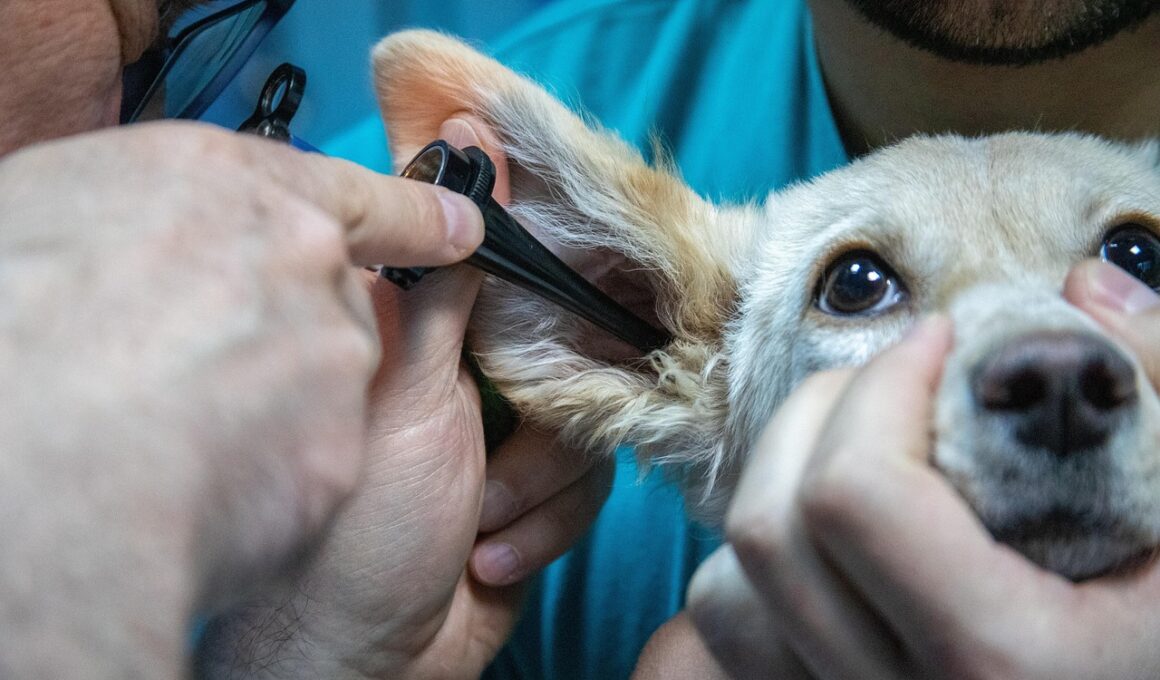Tips for Managing Chronic Ear Infections in Dogs
Chronic ear infections in dogs can be challenging to manage, but understanding the underlying causes is the first step toward effective treatment. Ear infections can stem from various sources, including allergies, mites, or environmental factors. Identifying these root causes will enable pet owners to create a plan tailored to their dog’s specific needs. Regular veterinary check-ups are essential in diagnosing the type of infection correctly. In many cases, a thorough cleaning and medication prescribed by a veterinarian can help manage the infection. Always monitor your dog’s behavior; excessive scratching or head shaking could signal irritation. Additionally, maintaining ear hygiene is vital. This includes cleaning the ears regularly with vet-approved solutions to help prevent future infections. Nutrition plays an essential role in your dog’s overall health. Make sure your dog is on a high-quality, balanced diet that supports their immune system. During treatment, keeping your dog away from water sources like lakes, ponds, or even swimming pools can help prevent further irritation and complications. Ultimately, proactive measures and regular consultations with your veterinarian will lead to healthier ears for your furry friend.
Environmental factors can also contribute to ear infections in dogs. It is essential to keep your dog’s living environment clean and free from allergens. Dust mites, mold, and pollen are common culprits that can irritate your dog’s ears and make them susceptible to infections. Regular cleaning of your home, especially areas where your dog spends a lot of time, helps minimize these risks. Consider using air purifiers and dust-free bedding to further reduce allergens in your pet’s environment. When your dog is outside, pay attention to any changes in their behavior or signs of discomfort, particularly during allergy seasons. If allergies are a contributing factor, your veterinarian may suggest allergy testing to identify specific triggers. They may recommend medications or changes in diet to manage these allergies effectively. Furthermore, checking your dog’s ears after outdoor activities is an excellent habit to ensure they are clean and free of debris. Establishing a routine for ear care can prevent many future problems. Investing time and effort into ear health now can save you significant trouble and expense down the line, ensuring a happier life for your furry companion.
Nutrition plays a vital role in your dog’s overall health, including ear health. Ensuring a balanced diet rich in omega-3 fatty acids can help support skin and ear health. Foods high in these beneficial fats can contribute to a stronger immune system and minimize inflammation, which can worsen ear issues. You may also want to consult your veterinarian about supplements specifically designed to improve skin and coat health. Additionally, some dogs might benefit from grain-free diets if they are sensitive to grains; this can sometimes alleviate ear infection symptoms. Be cautious with treats, as many can contain preservatives and artificial ingredients harmful to your dog’s health. Instead, opt for natural treats made from wholesome ingredients that support your dog’s overall wellbeing. Hydration is equally as important for ear health; ensure your dog has access to fresh water at all times. Moreover, avoiding overly processed foods filled with additives will promote better ear health and overall wellness. Consistent attention to your dog’s diet will yield positive results in maintaining ear health and preventing chronic infections. Well-nourished dogs are less likely to suffer from recurrent health issues.
Regular Veterinary Check-ups
Regular veterinary check-ups are crucial in managing chronic ear infections in dogs. Visiting the veterinarian allows for timely diagnosis and treatment of any underlying issues contributing to recurring infections. Your veterinarian may perform a thorough examination of your dog’s ears, checking for signs of infection, parasites, or allergies. Professional cleaning during these visits can help alleviate existing problems and prevent future infections by removing debris and wax buildup. Treatments vary based on the specific causes of the infections, and appropriate medications can be prescribed to target the type of bacteria or yeast present. Additionally, your vet can provide personalized advice on ear care and recommend suitable products based on your dog’s specific needs. Regular check-ups also allow for monitoring any changes in your dog’s health, which is essential for staying ahead of potential issues. Moreover, discussing any new symptoms or behaviors at these visits is vital in ensuring comprehensive care. Keeping a log of any ear problems or treatments can be beneficial during visits to give your vet a clearer picture of your dog’s health history. Prioritize these appointments to keep your dog’s ears healthy and infection-free.
Investing time in proper ear care is essential for preventing infections in dogs. Establish a routine to check your dog’s ears regularly, looking for signs of redness, swelling, or discharge. If you notice any unusual odor or changes, consult with your veterinarian immediately. When cleaning your dog’s ears, use only veterinarian-recommended products, as improper cleaning can cause more harm than good. Warm the cleaning solution before applying it; this makes the experience more comfortable for your dog. Be gentle while cleaning, avoiding any deeper insertion into the ear canal. After applying the cleaner, massage the base of the ear to help dislodge debris, allowing your dog to shake their head afterward helps expel excess fluid. It’s also beneficial to reward your dog after ear cleaning sessions, reinforcing positive experiences associated with ear care. Understand your dog’s body language; some might be more sensitive than others and will require extra coaxing. With practice, ear cleaning can become a regular part of your dog’s grooming routine, significantly reducing their chances of developing chronic infections.
Understanding Symptoms of Ear Infections
Recognizing the symptoms of ear infections is key to prompt treatment. Dogs may exhibit various signs indicating they are suffering from ear issues, including excessive scratching, shaking their heads, and rubbing their ears against furniture or the ground. Other symptoms might include redness or swelling around the ear, a foul odor, or strange discharge. If your dog appears more irritable or seems to be in pain when their ears are touched, these could be signs of discomfort. Pay attention to your dog’s behavior after grooming or outdoor adventures, as they might experience increased irritation. Timely intervention when you observe these symptoms is essential for preventing further complications. Keeping a watchful eye on their grooming habits can help catch infections early. Regularly check for debris or wax build-up when combing your dog’s fur. A thorough inspection, ideally weekly or bi-weekly, can aid in spotting potential problems. When in doubt, never hesitate to reach out to your veterinarian for advice if you suspect an ear infection. Understanding these early warning signs can make a significant difference in the treatment outcome for your dog.
Preventing chronic ear infections in dogs goes hand in hand with maintaining a clean environment and proper grooming. Regularly bathing your dog and ensuring their ears remain dry can significantly decrease the risk of infections. Moisture in the ears can create a breeding ground for bacteria and yeast. After swimming or bathing, ensure you dry your dog’s ears effectively using a soft, dry cloth. If your dog enjoys swimming, consider investing in earplugs designed for canines, especially for those prone to infections. Additionally, consider the climate where you live. Humidity can worsen ear problems, so adapt your dog’s routine accordingly. Experience suggests that dogs prone to ear infections will benefit from limited exposure to wet conditions. Creating a checklist for ear care will ensure complete attention to this aspect of your dog’s health. Keep all necessary cleaning supplies accessible, making ear maintenance easier. Regularly remind yourself that proactive measures today can prevent complications tomorrow. Overall, the commitment to managing your dog’s ear health will ensure more comfortable and happier days for your furry companion and reduce the feeling of stress for owners concerned about their pet’s health.
Managing chronic ear infections in dogs requires a well-rounded approach including veterinary care, proper nutrition, and grooming. A proactive methodology ensures your dog stays healthy and can lead to a greater quality of life. Knowledge about potential issues and cleaning routines will empower dog owners. Stay on top of routine check-ups, and always be willing to advocate for your dog’s health, especially when allergies and underlying conditions arise. Forming a relationship with your veterinarian based on trust and open communication will guide you through the complexities of your dog’s health. Understanding that ear infections are manageable with correct information and care can alleviate some stress from dog ownership. Consistent practice of ear care, nutrition management, and maintaining a clean environment will contribute significantly toward preventing chronic infections. Always remember that love and attention from a pet owner are essential; through these small acts of care, dogs will thrive. Share experiences with fellow dog owners about best practices in managing ear health and stay informed about new treatments and methods. Ultimately, healthy ears lead to happier dogs and peace of mind for their owners.


